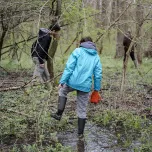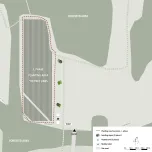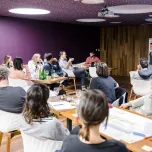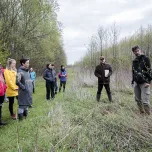Developing Ecology for Design through local afforestation
Moholy-Nagy University of Art and Design of Budapest (MOME) is working on becoming a carbon neutral university by 2030. In order to achieve this aim, MOME launched The MOME Zero project including 4 main pillars - 1) green education 2) off-campus climate protection projects 3) research & development projects 4) on-campus infrastructural and operational changes towards carbon neutrality.
As part of the first pillar, the Ecology for Design course started in 2023 which is a scale-up of the existing environmental sustainability initiative of MOME. The programme will enhance fundamental literacy in global ecological, environmental and sustainability issues among entry level students in all design and theoretical departments.
The project constitutes a 12-module accredited course over a semester, interspersed with various field activities, including a 3-day afforestation field-work module in a National Park that will take place in November on 16-18, 2023, during which the entire first year BA students together with 179 instructors will plant 20,000 tree saplings. MOME's community works in collaboration with forest engineers and environmental protection professionals to plant and manage the forests. Joining forces with three national parks – the Balaton Uplands National Park, the Danube-Drava National Park and the Duna-Ipoly National Park – it will develop new forests in three locations across Hungary over almost 50 hectares. The installation will be preceded by ecological presentations and presentations by sustainability experts. University citizens master the basics of ecological awareness that are essential in the 21st century during fieldwork. Students can gain tangible knowledge about the interaction between nature and man, and about the principles underlying sustainable design through university education.
The course and the linked reforestation have been co-created with the involvement of different stakeholders from the very beginning. The University’s top management, students, teachers, a VET educational institution, the National Park representatives, forest engineers and environmental protection professionals contributed to the development of this project. With the help of the experts and local representatives of the National Park a suitable place was found that could be improved in terms of biodiversity, biomass production and carbon emission by reforestation. Lead designers developed the involvement of design students and the related BA curriculum.
By reforesting, the university is reducing its carbon footprint in order to become carbon neutral by 2030 and thus contribute to the fight against climate change. These activities along with the results are regularly communicated in mainstream media and disseminated in professional channels and events as well.
On the field works, students will learn about the forest ecosystem and gain basic sustainability and ecological knowledge from invited experts. The practical experience of forestation will help them to understand the importance of long-term thinking, ecological responsibility and individual and community engagement as a designer and/or as a citizen. The course also aims to build community over different disciplines and develop collaborative skills.
The course helps students understand the fundamental principles that underlie global ecological systems, their interlinkages and the influence of human activities on the environment. The course focuses on human activities and choices that enable the transition to a greener and sustainable future, underscoring the importance of design, material and art.
The course offers a holistic approach to understanding complex grand challenges such as climate change and biodiversity loss, through problem solving applying design thinking principles and coupling these with sustainability and circular economy applications. The course also aims to introduce the role of art and design in environmental protection.
In MOME’s design education, sustainability, circularity, carbon neutrality and combating climate change have been present for a while as it is deeply connected to all areas of design from product design to architecture. However, from now on, it is shifted to a next level as all entry level BA students will be systematically involved not only in theoretical education of sustainability but also in practical activities, which will engage them with nature, nature conservation, activism and they will be more aware of incorporating the ecological aspect into design processes. As a consequence, creating environmentally conscious products and services will not only be ‘nice to have’ but a ‘must have’ in their future works.
As designers can shape almost every aspect of our life through their work from urban spaces to everyday objects, transportation and even lifestyle or policy making, we believe that their knowledge, skills and mindset have the ability of shaping the future.
https://mome.hu/en/news/mome-is-planting-forests-throughout-the-country







Please log in or sign up to comment.